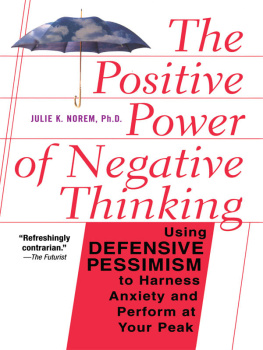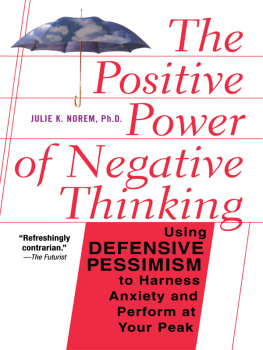The Positive
Power
of Negative
Thinking
The Positive
Power
of Negative
Thinking
Using Defensive Pessimism
to Manage Anxiety
and Perform at Your Peak
Basic Books
A Member of the Perseus Books Group
Copyright 2001 by Julie K. Norem
First paperback edition published in 2002 by Basic Books, a member of
the Perseus Books Group.
All rights reserved. Printed in the United States of America. No part of
this book may be reproduced in any manner whatsoever without written
permission except in the case of brief quotations embodied in critical
articles and reviews. For information, address Basic Books, 387 Park
Avenue South, New York, NY 10016-8810. For information on special
discounts for bulk purchases in the United States by corporations,
institutions, and other organizations, please contact the Special Markets
Department at the Perseus Books Group, 11 Cambridge Center,
Cambridge, MA 02142; or call 617-252-5298.
Set in 11 point Bembo by Perseus Publishing Services
Library of Congress Cataloging-in-Publication Data
Norem, Julie K., 1960
The positive power of negative thinking : using defensive pessimism
to manage anxiety and perform at your peak / Julie K. Norem.
p. cm.
Includes bibliographical references and index.
ISBN 0-465-05138-3 (hc); 0-465-05139-1 (pbk)
eBook ISBN: 9780786725304
1. SuccessPsychological aspects. 2. Pessimism. I.Title.
BF637.S8 N65 2001
158.1dc21 2001035481
CIP
02 03 04 05 / 10 9 8 7 6 5 4 3 2 1
To my parents, Rosalie H. Norem,
Ken Norem, and Sandy Magnuson;
my husband, Jonathan Cheek;
and my children, Nathan and Haley
Therefore, since the world has still
Much good, but much less good than ill,
And while the sun and moon endure
Lucks a chance, but the troubles sure
Id face it as a wise man would
And train for ill and not for good.
A. E . HOUSEMAN
1
Preamble to a Contrarian View
In all affairs its a healthy thing now and then to hang a question mark on the things you have long taken for granted.
BERTRAND RUSSELL
T he positive power of negative thinking? That proposition sounds almost heretical in American society, bastion of full glasses, silver linings, and the ubiquitous yellow smiley face. Can someone seriously argue that there are benefits to pessimism? Thats exactly what I do in this book. Defensive pessimism is a strategy that can help anxious people harness their anxiety so that it works for rather than against them.
Defensive pessimists expect the worst and spend lots of time and energy mentally rehearsing, in vivid, daunting detail, exactly how things might go wrong. Before a business presentation, they worry that PowerPoint might fail, that the microphone will go dead, thatworst of allthey will stare out at the audience and go blank. Before a dinner party they imagine that the new neighbors will clash with the old and the sushi will give everyone food poisoning.
Wheres the power in this? Dont these negative imaginings leave us whimpering helplessly at the prospect of disaster? Why not be optimistic instead, look on the bright side, think positive thoughts, and give it our best shot? After all, research shows that for many people, optimism is related both to feeling better and trying harder.
Accentuating the positive is not bad advice, but it suffers from the same problem that plagues one size fits all clothing: People come in more than one size. Different people face different situations, encounter different obstacles, and have different personalities. Trying to squeeze everyone into an optimistic perspective can be both uncomfortable and unproductive, like struggling to stuff a queen-size body into petitesizec pantyhose.
RELAXITLL ALL WORK OUT simply isnt always true.We have to make things work for ourselves. Trying to adopt a positive outlook when we are anxiousan outlook that discounts our anxietycan backfire.An anxious business person who denies or ignores her anxiety before a presentation actually increases the likelihood that shell stutter, fumble, and lose her train of thought before a live audience; an anxious host who doesnt keep in mind the possibility of food poisoning may leave the fish out too long and wind up chauffeuring his guests to the hospital.
Defensive pessimism is a strategy that helps us to work through our anxious thoughts rather than denying them, so that we may achieve our goals. In this book well see how anxious people can turn their anxiety into productive motivation that helps them optimize their performance. Defensive pessimism is emphatically not about leading anxious people into depression; quite the contraryit can actually aid our efforts toward self-discovery and enhance our personal growth.
I BEGAN STUDYING defensive pessimism back in the mid- 1980s, when I was in graduate school. Research on the benefits of optimism was very hot, and looking into the potential advantages of pessimistic perspectives automatically appealed to my contrarian side. Besides, la Rashomon, Id always been intrigued by the ways that people participating in the same conversation or witnessing the same event could have radically different experiences, which is just how it is with my married friends, Katherine and Bill, whose clashing strategies open the next chapter.
Once I began to look, I found myself surrounded by people who were notably successful, by virtually any definition, and not notably optimistic.According to the research on optimism, this shouldnt be. Pessimism should produce negative results.When we set low expectations, we initiate a self-fulfilling prophecy. For example, if we convince ourselves that well never pass the test to get our drivers license,we wont spend time studying the manual and practicing how to parallel park. Once we get to the test,well have no idea how many feet were supposed to be behind the car in front of us when it is foggy.Then sure enough, just as we expected,we wont pass the test.
But that discouraging description didnt fit all of the pessimists I saw around me. For example,my mentor at the time, a dynamic and successful woman who personified defensive pessimism (and who coined the term), utterly defied the prevailing wisdom that we have to be relentlessly positive to get ahead. Before every professional event in her life, she would regale me with an impressively impassioned and precise description of the failure and humiliation that awaited her (So-and-so will be sure to ask about some arcane study that Ive never heard of ; Ill look like a little girl behind that huge lectern, and no one will take me seriously), but somehow that failure never materialized. Instead, she always passed the test and achieved whatever she pursued; her career trajectory was and is straight up.
There was plenty of research that indicated that people like her should be depressed, sickly, unmotivated, helpless, and hopelessyet they certainly didnt seem that way to me.The researcher in me was driven to understand these people who apparently contradicted a well-established body of research. Why wasnt their pessimism debilitating? At first, I asked how these people were able to do so well despite their pessimism. Before long, however, I began to realize that they were doing so well because of their pessimismand thats when things got really interesting. I began to understand that their pessimism wasnt just pessimism; it was something more. Defensive pessimism encompassed an entire process by which negative thinking transformed anxiety into action.













